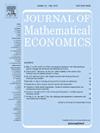分解性和社会比较陷阱
IF 0.7
4区 经济学
Q3 ECONOMICS
引用次数: 0
摘要
我们提出了一个统一且易于处理的社会比较偏好模型,该模型将竞争动机和不完全不平等厌恶作为特殊情况。我们确定了一个关键属性,称为可分解性,并表明在社会比较偏好下,玩家在可分解游戏中是战略独立的,从而在每个可分解游戏中产生一个一般唯一的解决方案。可分解游戏的类别很广泛,包括每一个2 × 2对称游戏,以及多人、多策略游戏,如最小努力游戏、公共产品游戏和公地悲剧。通过这一特征,我们发现社会比较通常会导致不理想的结果,有时甚至比所有玩家都是物质收益最大化者所产生的结果还要糟糕。本文章由计算机程序翻译,如有差异,请以英文原文为准。
Decomposability and the social comparison trap
We propose a unified and tractable model for social comparison preferences that nests competitive motives and imperfect inequality aversion as special cases. We identify a key property called decomposability and show that players are strategically independent in decomposable games under social comparison preferences, yielding a generically unique solution in every decomposable game. The class of decomposable games is broad, including every 2 × 2 symmetric game as well as multi-player, multi-strategy games such as the minimum effort game, public goods game, and tragedy of the commons. Using this characterization, we show that social comparison often results in undesirable outcomes, sometimes worse than any outcome that would arise if all players were material payoff maximizers.
求助全文
通过发布文献求助,成功后即可免费获取论文全文。
去求助
来源期刊

Journal of Mathematical Economics
管理科学-数学跨学科应用
CiteScore
1.70
自引率
7.70%
发文量
73
审稿时长
12.5 weeks
期刊介绍:
The primary objective of the Journal is to provide a forum for work in economic theory which expresses economic ideas using formal mathematical reasoning. For work to add to this primary objective, it is not sufficient that the mathematical reasoning be new and correct. The work must have real economic content. The economic ideas must be interesting and important. These ideas may pertain to any field of economics or any school of economic thought.
 求助内容:
求助内容: 应助结果提醒方式:
应助结果提醒方式:


